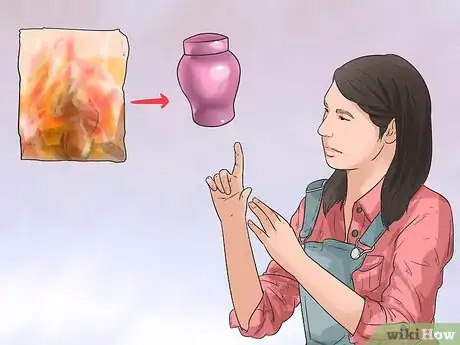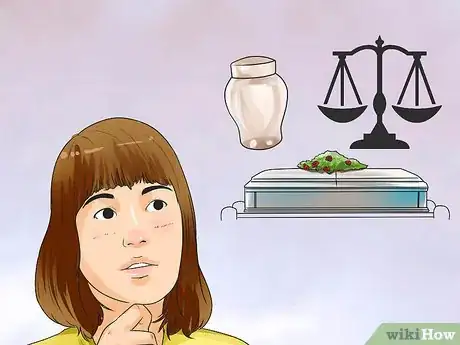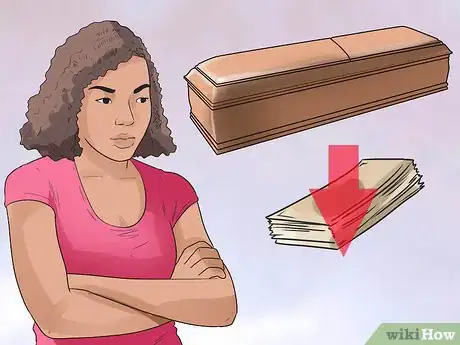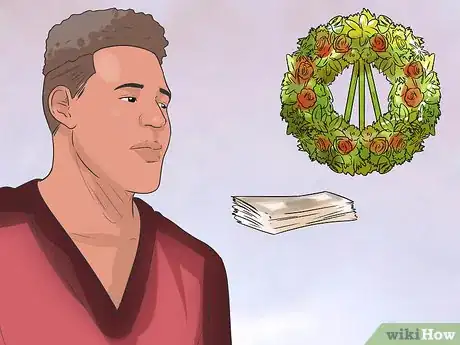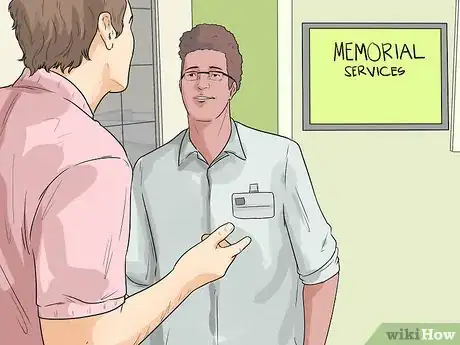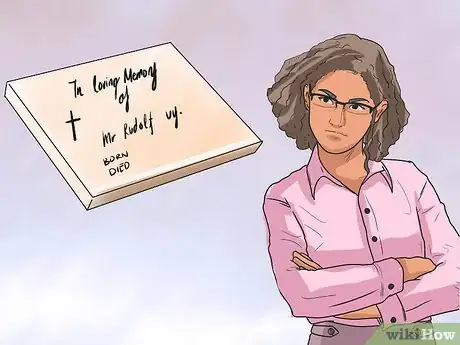This article was co-authored by David I. Jacobson. David I. Jacobson is the founder of Chicago Jewish Funerals, an independent Jewish owned funeral provider that evolved into two funeral homes in the Chicagoland area. With over 30 years of experience serving families, David is a leading expert on Kavod Hamet, the Jewish traditions of honoring and respecting the dead. David is an active funeral director that serves people planning and in need of funerals, lecturing to congregations, community groups, and schools extensively about the values of the Jewish funeral as well as the dying process and the value of one’s legacy.
There are 9 references cited in this article, which can be found at the bottom of the page.
This article has been viewed 36,590 times.
Losing a loved one is a life altering and extremely difficult event. Unfortunately, at the same time you’re coping with the loss of someone, you're also having to deal with the cost and logistics of a funeral. This is made even worse by the fact that the cost of funerals can run from $5,000 to $20,000 or more. However, this substantial cost depends on a wide variety of factors that you, your friends, and your family can choose. Ultimately, with a little information and some research, you’ll be able to plan a wonderful and memorable funeral without breaking the bank.
Steps
Thinking About a Final Resting Place
-
1Determine if you want a traditional burial. Perhaps the first step you need to take is to research the cost of a traditional burial. Traditional, casket-based, burials are the way that most Americans choose to be buried. Remember that:
- This option will usually be the most expensive. Costs can and often do exceed $10,000, however, depending on what you pick, simple traditional burials can be done for less than $4,000.
- Traditional burials require a place for your loved one to be buried. If you do not already have a pre-purchased plot in a cemetery, this could add a considerable cost.
- There are no laws that require traditional burial. However, you should consider the last wishes of your loved one as well as their religious and spiritual affiliation.[1]
-
2Consider cremation. Cremation is an alternative to traditional burial and offers a number of benefits in terms of cost. As a result, any budget minded person should consider cremation as an option. When thinking about cremation, remember:
- Prices are substantially less than those for a full burial. While traditional burials could cost $10,000 or more, the average cost of a cremation is between $2,000 and $4,000. The price disparity is because you are saving money on a casket, embalming, and a variety of other products and services.
- Normally the funeral home will make the necessary arrangements for you and will call you when the remains are ready to be picked up.
- One way to save even more money on a cremation is to arrange it directly through a crematory, rather than through a funeral home.
- Several companies offer already made, or custom-made, urns. Do comparison shopping for the best price. Urns can cost from as little as $100 to several thousand.
- You may want to forgo the urn and, instead, scatter the ashes in a special location.
Advertisement -
3Think about donating the body to medical research. Donating your loved one’s body to medical research is an important option to consider. Donation to medical research will both benefit the larger society and help enable you avoid the cost of a cremation or burial.
- You should consider your loved one’s thoughts on donation to medical science. Many people who want to be donated to science put a stipulation in their will or will otherwise inform friends and family of their wishes.
- If you (or your deceased loved one) favor/favored this option, you can contact your local university of hospital to see if it is a realistic possibility.
- This is by far the least expensive option. Normally the only cost of donation is transportation. After that, you just have to choose and plan a memorial service.[2]
Choosing an Affordable Funeral
-
1Set a budget. Depending on your choice of a final resting place, your budget will vary widely. Ultimately, though, your budget will in effect act as a guideline for every other step you take after establishing it. As a result of this, figuring out a budget should be your first priority when you begin the process of planning a funeral.
- Keep in mind that the lowest possible cost for a funeral will be between $1,000 and $2,000. This will cover the bare minimum: the cost of caring for, transporting, and cremating your loved one (if you choose those options).
- Take into account any life insurance, burial insurance, or other money the deceased has left behind or specifically earmarked for their final expenses.
- Figure out if other friends or family want to or are able to contribute to your loved one’s final expenses.[3]
- A good funeral director will help you work within your budget to create a service that will feel meaningful and special.[4]
-
2Decide on the type of funeral. After you’ve set your budget, you need to decide what type of funeral you want to have. During this decision-making process you’ll determine the several things about the funeral. You’ll consider:
- Whether the funeral should be open to the public.
- Whether you will advertise the funeral publicly.
- If you want to have a long or a short service.
- Whether you want to have just a memorial service at a place other than the cemetery (this makes a lot of sense if you choose to donate the body to science).
- The wishes of the deceased.
- The least expensive funerals/memorial services tend to be simple, private, and held at the graveside or at someone's home.
-
3Determine the location(s) of the funeral. After deciding the type of funeral you want to have, you should decide where you want to have the actual funeral or memorial service for your loved one. The location of a funeral can (depending on certain factors) be a substantial part of the cost of a funeral, so it is important that you consider this early on.
- Often times, funeral homes will allow you to hold a service there for no cost or for a very low cost. You could also consider holding a simple graveside funeral.[5]
- If you need to travel to bury your loved one, or if the majority of your family lives in one place far away, this might add considerable expense in terms of transporting your loved one.
- You could also have a memorial service for your loved one, which is a service without your loved one's body present. This is a good option if your loved one is being buried far away, or if you're unable to gather at the time of the funeral.[6]
-
4Know the law. The Federal Trade Commission has laws that govern funeral homes and related professionals. Before you even begin to consult with funeral professionals, you should know the laws that govern them and protect you as a consumer.
- Funeral directors are required to give you itemized quotes in person. If you are communicating over the phone, you have to ask for prices explicitly.
- You are not required to purchase packages from funeral professionals. You are allowed to purchase items individually.
- If any items is required by law, the funeral professional must be able to reference the specific law.
- You are allowed to bring your own casket, and you don’t have to pay a related service or handling fee.
- You are not required to purchase a casket for cremation.
- Before viewing caskets, funeral professionals should give you a list of caskets and prices.[7]
Planning the Funeral
-
1Research the funeral services that are best for your needs. After you’ve determined your budget and what sort of funeral you want to have, you need to begin to shop around for funeral services. For the vast majority of people, it is impossible to do without the services of a funeral home, as they accept delivery of the body, prepare the body, and coordinate many aspects of the funeral.
- Funeral homes, as one of the main purveyors of all funeral-related services, serve as the highest costs of any funeral. One of the easiest ways to save money on a funeral is to do research to find for funeral homes and services.
- Call several funeral homes in your area and ask them to provide you with a list of charges.
- Try websites which will allow you to receive estimates from providers.
- Check out the Funeral Consumers Alliance website which will help you make important decisions about funeral related costs.
-
2Decline embalming. Embalming is the process in which morticians use chemicals to help preserve your loved one. Embalming is often done to slow the deterioration of the recently deceased in order to make an open casket possible at funerals. As a result, depending on your budget and wishes, you can opt out of embalming.
- If you opt out of embalming, you will most likely not be able to have an open casket.
- Declining embalming can make the cost of a funeral substantially lower.
- If you opt out of embalming, you will most likely need to hold a memorial service and bury the deceased within 1-3 days of death.
- You do not need to embalm if you choose cremation or donate your loved one’s body to medical science.
-
3Pick an affordable casket. One of the most expensive single items when it comes to funerals are the caskets (if you choose to go with a traditional burial). When making decisions about burying a loved one, many people think that they need to spend a lot on a casket to show a final act of love. This is not true. Pick a casket that is in your budget and is affordable.
- Avoid “gasketed caskets.” These caskets are designed to seal better than regular caskets. While gasketing the casket only costs the funeral home a nominal amount of money, it could cost you hundreds of dollars.
- Pick a respectable casket that is in your price range.
- Buy your casket from a wholesaler or online. While your funeral home might not be happy, this could save you a lot of money.
- Let the funeral professional know you are on a budget, but don’t divulge your budget.[8]
-
4Save on flowers. Flowers are another major expense when it comes to funerals. While you may want the memorial service/funeral for your loved one to be beautiful and memorable, the cost of extravagant flowers may hurt you in the pocket. Remember, you can have a wonderful and memorable funeral without breaking the bank. Make sure the flowers you choose fit into your budget.
- Pick flowers that are in season and available locally.
- Track down the flowers yourself, instead of having the funeral home supply them.
- Decline the funeral home’s flower package. Chances are, they’ll charge you substantially more than you’d pay if you hired a florist or brought in the flowers yourself.[9]
-
5Find an affordable person to lead the memorial service. While the cost (“gratuity”) of a rabbi, priest, minister or other religious/spiritual leader may not be that much, it is an important cost to consider when trying to plan a funeral on a budget. When finding someone to lead the service, consider:
- Your loved one might have known a minister, rabbi, or another spiritual leader who will be happy to speak at or lead the service free of charge.
- The cost of someone to lead the service might be between one hundred and three hundred dollars, depending on region.
- If you are on a really tight budget, lead the service yourself and recruit friends and loved ones to help and to share remarks.[10]
-
6Do research before buying a headstone, burial vault, and/or grave liner. One of the last substantial costs you need to consider when arranging for your loved one’s final expenses is the cost of the headstone, burial vault, and/or the grave liner. Make sure to shop around for these purchases. Consider:
- Typical flat grave markers may cost $1,000 or more.
- Average upright headstones can cost up to $10,000. However, simple headstones often average between $1,000 and $3,000.
- Burial vaults (above ground structures or below ground structures) can cost $10,000 or much more.
- Grave liners are concrete structures placed in the ground to prevent the ground from subsiding as the casket deteriorates over time. Grave liners can cost up to $1,000. Talk to independent vendors for competitive prices on grave liners.
- While your funeral home may sell you a headstone or burial vault, you should definitely shop around and contact wholesalers and other independent vendors in order to save money.
Expert Q&A
-
QuestionWhat happens if a family can't afford a funeral?
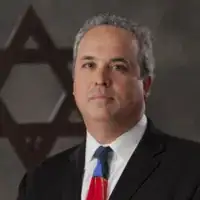 David I. JacobsonDavid I. Jacobson is the founder of Chicago Jewish Funerals, an independent Jewish owned funeral provider that evolved into two funeral homes in the Chicagoland area. With over 30 years of experience serving families, David is a leading expert on Kavod Hamet, the Jewish traditions of honoring and respecting the dead. David is an active funeral director that serves people planning and in need of funerals, lecturing to congregations, community groups, and schools extensively about the values of the Jewish funeral as well as the dying process and the value of one’s legacy.
David I. JacobsonDavid I. Jacobson is the founder of Chicago Jewish Funerals, an independent Jewish owned funeral provider that evolved into two funeral homes in the Chicagoland area. With over 30 years of experience serving families, David is a leading expert on Kavod Hamet, the Jewish traditions of honoring and respecting the dead. David is an active funeral director that serves people planning and in need of funerals, lecturing to congregations, community groups, and schools extensively about the values of the Jewish funeral as well as the dying process and the value of one’s legacy.
Funeral Home Director Hold the service at your loved one's church, synagogue, or other place of worship if they were religious. In most cases, these locations will be at low or no cost. Some funeral homes specialize in religious services, as well.
Hold the service at your loved one's church, synagogue, or other place of worship if they were religious. In most cases, these locations will be at low or no cost. Some funeral homes specialize in religious services, as well. -
QuestionHow can funeral costs be reduced?
 David I. JacobsonDavid I. Jacobson is the founder of Chicago Jewish Funerals, an independent Jewish owned funeral provider that evolved into two funeral homes in the Chicagoland area. With over 30 years of experience serving families, David is a leading expert on Kavod Hamet, the Jewish traditions of honoring and respecting the dead. David is an active funeral director that serves people planning and in need of funerals, lecturing to congregations, community groups, and schools extensively about the values of the Jewish funeral as well as the dying process and the value of one’s legacy.
David I. JacobsonDavid I. Jacobson is the founder of Chicago Jewish Funerals, an independent Jewish owned funeral provider that evolved into two funeral homes in the Chicagoland area. With over 30 years of experience serving families, David is a leading expert on Kavod Hamet, the Jewish traditions of honoring and respecting the dead. David is an active funeral director that serves people planning and in need of funerals, lecturing to congregations, community groups, and schools extensively about the values of the Jewish funeral as well as the dying process and the value of one’s legacy.
Funeral Home Director Everyone has a different opinion about what's expensive and what's not expensive, so it's important to work with a trustworthy funeral director. They'll help you figure out how to achieve the service you want while helping you get a fair price.
Everyone has a different opinion about what's expensive and what's not expensive, so it's important to work with a trustworthy funeral director. They'll help you figure out how to achieve the service you want while helping you get a fair price. -
QuestionWhat is a green funeral?
 Community AnswerA green funeral is a funeral in which the embalming process is waived, flowers are limited, and the casket is a less expensive and often times made of materials that biodegrade relatively fast.
Community AnswerA green funeral is a funeral in which the embalming process is waived, flowers are limited, and the casket is a less expensive and often times made of materials that biodegrade relatively fast.
References
- ↑ https://www.consumer.ftc.gov/articles/0301-funeral-costs-and-pricing-checklist
- ↑ http://www.huffingtonpost.com/jim-t-miller/how-to-save-money-by-donating-your-body-to-science_b_2162564.html
- ↑ https://www.parting.com/blog/how-to-plan-an-affordable-funeral/
- ↑ David I. Jacobson. Funeral Home Director. Expert Interview. 14 July 2020.
- ↑ https://www.funerals.org/affiliates/tampabay/mstb-34.htm
- ↑ David I. Jacobson. Funeral Home Director. Expert Interview. 14 July 2020.
- ↑ https://consumerist.com/2009/03/06/save-money-on-a-funeral/
- ↑ http://www.marketwatch.com/story/7-ways-to-save-on-funeral-costs-2014-03-27
- ↑ http://personalfinance.costhelper.com/funeral-flowers.html

